- Home
- Jude Hardin
The Reacher Experiment
The Reacher Experiment Read online
THE JACK REACHER EXPERIMENT
BOOKS 1-3
DEAD RINGER
MOVING TARGET
NO ESCAPE
JUDE HARDIN
DEAD RINGER
THE JACK REACHER EXPERIMENT BOOK 1
1
Hundreds of big-rig headlights had whooshed by over the past couple of hours, and there wasn’t anything particularly unusual about the pair Wahlman was looking at now.
Except that they were headed straight toward him.
He dove and rolled down the grassy embankment to his left. He half expected the semi to follow him and crush him, but it didn’t. It thundered on by, transmitting vibrations all the way down to the bottom of the ditch, tremors that stomped through Wahlman’s core like a herd of rhinos. There was no slowing down, no grinding of gears, no screeching of brakes. No indication that a human being was behind the wheel.
Amped on adrenaline, breathing hard, Wahlman clawed his way up the slope, handfuls of slick grass eventually giving way to the gritty pavement at the top.
The massive vehicle continued westward along the shoulder, veering slightly to the right, roguishly, inelegantly, just a stupid machine lumbering through the misty blackness. A machine the size of a house. A machine that would destroy anything in its path.
Wahlman didn’t own a cell phone, and there weren’t any cars or trucks or motorcycles to flag down at the moment. The interstate had been eerily quiet before the semi approached. No vehicles for several minutes, westbound or eastbound. Wahlman didn’t know if it was like that every Sunday at 4:17 in the morning, but he figured it probably was. If you were in Slidell, you probably weren’t going to be driving into New Orleans at that hour, and vice versa. You were probably in bed. Maybe one of the lucky ones who could actually sleep through the night every night.
The big truck rolled on. Probably a Freightliner, the way a soft drink is probably a Coke, although it could have been a Kenworth or a Peterbilt or a Mack. Or some other brand. It was pulling a heavy load. You could tell by the hum of the tires on the pavement.
The headlights illuminated a bridge up ahead, a small one built over a canal.
Wahlman figured the truck was traveling at a speed between fifty and sixty miles an hour. Not inordinately fast, but certainly not slow either. Maybe it had been coasting for a while. Maybe the driver had fallen asleep. Or died of a heart attack or something.
Wahlman was standing there wondering exactly what had happened when the semi crashed through the concrete railing that ran along the side of the bridge. The trailer broke loose and toppled cacophonously out into the middle of the highway, showering the pavement with bright orange sparks as the tractor plunged nose-first into the water.
Wahlman wasn’t much of a runner. He never had been. He’d played football in high school, but they always put him in a position that didn’t require much speed. Offensive line, most of the time. At six feet four inches tall and two hundred forty pounds, there weren’t many players who could get past him. In his senior year, a sports reporter at the local newspaper started calling him Rock, and the name stuck. He’d been nearly impenetrable on the football field, but he wasn’t fast. Not then, not now. He galloped clumsily toward the wreckage, greasy hot steam from the submerged engine rising and meeting him as he finally made it to the edge of the bridge.
The headlight on the driver side was still on, cutting a wedge of brightness into the murky brown canal water. The water wasn’t very deep. Eight feet at the most. Wahlman couldn’t see into the cab, but he could hear the muffled roar of a classic heavy metal song blaring from the stereo. Nobody could have fallen asleep to that, he thought. Which meant that the driver had lost consciousness some other way. Maybe a cardiac event. Or a stroke. Or something else.
Wahlman pulled his boots off, slid down into the water and peered into the passenger side window. The driver was male, late thirties or early forties, as big as Wahlman, maybe a little bigger. He wore a plaid shirt and a black ball cap. His eyes were closed. There was a thread of blood that started at the corner of his mouth and ended at the edge of his button-down collar. The water inside the cab was up to his chest. Wahlman couldn’t tell if he was breathing or not.
Wahlman pounded on the window.
The driver didn’t stir.
The music had stopped, and the headlight was getting dimmer by the second.
Wahlman went up for a quick breath of air, and then he dove back down and got on his hands and knees and frantically started searching for something to break the window with. He raked his fingers through the silt, combing a radius of several feet, scooping and grasping at the sandy mud, coming up empty again and again.
He climbed around the engine housing to the other side of the cab, cupped his hands against the window. The water was up to the driver’s chin now. Wahlman reared back and hammered the glass with his fist, but it was no use. The resistance from the water prevented the blows from being forceful enough. Maybe he could break through with the heels of his feet, he thought, but he needed to get another breath of air first. He was about to push himself back up to the surface when the driver’s eyes opened.
“Help,” the guy shouted. “Help me. Please.”
Wahlman made a cranking motion with his hand.
“Roll the window down,” he said.
Water would flood the cab, violently, like a dam bursting, but then the pressure would equalize and the guy might be able to pull himself out.
“I can’t move my arms,” the man said.
Every cell in Wahlman’s body was screaming for oxygen. He held one finger up to let the driver know he would be right back, and then he surfaced and swam over to the bank. Gasping, coughing, lungs on fire. He grabbed a rock the size of a softball, jumped back into the water and made his way down to the passenger side window. The water was up to the driver’s nostrils now. Wahlman started slamming the window with the rock, but the glass didn’t break. The water was slowing him down and he was lightheaded and his muscles were starting to fatigue. It felt as though he had been drugged and beaten and thrown into a vat of pancake syrup.
The driver made one last gurgling cry for help as the headlight grew dimmer and dimmer and then went totally black. Wahlman couldn’t see anything now. He kept trying to break the window. There was nothing else he could do. He tried several different angles, coming down as hard as he could, gripping the rock with both hands, pounding and pounding and pounding, finally hearing a muffled crack as the safety glass crumpled and folded inward. There was no big gush, as he thought there would be, which meant that the cab was completely full of water now.
Using the rock to grind off any remaining chunks of glass from the window frame, Wahlman managed to climb in and grab the driver by his shirt and pull him out of the truck. The guy was unconscious now. Totally limp. Dead weight. Wahlman struggled to get him into a rescue hold, but it was no use. The man slipped away and sunk to the bottom of the canal like a sack of bowling balls.
Wahlman needed air. He surfaced and took a deep breath, and another, the air warm and wet and heavy, and then he went back down and lifted the driver onto his shoulders, trudged up the slope and heaved the unconscious man onto the rocky bank.
Wahlman was nearly unconscious himself. He coughed out some water and sucked in some air and reached over and pressed two fingers against the side of the man’s neck to see if he had a pulse. Nothing. Wahlman struggled to his knees and started chest compressions, noticed right away that the bottom of the man’s shirt was soaked with blood.
And then he noticed something else.
The man looked exactly like him.
Same facial features, same hair color, same massive arms and shoulders. The guy had a tattoo on his neck, but otherwise
it was like looking into a mirror.
Wahlman continued performing chest compressions.
“Breathe,” he shouted.
But the man didn’t breathe. And when a thick glob of blackish-red blood oozed out from the center of his mouth, Wahlman decided it was time to stop the resuscitation efforts. He scooted away from the corpse, rolled onto his back, stared up at the diffuse moonlight. A thick blackness engulfed him, and he wondered if he was dying, and he thought he was, and his fingers started tingling and his legs went numb and there was nothing he could do but lie there and let it happen.
2
There was a bright light in Wahlman’s face and someone was shaking his shoulder and asking him if he was all right. When he opened his eyes, he saw the silhouette of a police officer standing over him.
He sat up and fought off a wave of nausea.
“I’m okay,” he said.
The officer nodded. He slid the flashlight into a compartment on the left side of his belt, between the stun gun and the pepper spray, and then he reached up and keyed the microphone attached to his right epaulet. He announced his unit number and location and told the person on the other end to alert the homicide division and the coroner’s office.
“We’re going to need a tow truck and a crane and a rescue unit and as many cruisers as you can spare,” he said.
The patrolman was young. Twenty-two or twenty-three, Wahlman guessed. Certainly no older than twenty-five. His badge said NOPD. New Orleans Police Department. He had pale skin and blue eyes and reddish-blond hair. Five-seven or five-eight, a hundred and fifty pounds at the most. He hadn’t been on the job long. Wahlman could tell. He didn’t have the air of confidence that came with experience. Maybe this was his first night out in a cruiser by himself. Or maybe this was just the first time he’d worked a major accident.
Wahlman looked up at the bridge. Traffic on the westbound side of the interstate was backed up as far as he could see. A lot of trucks, probably heading into town to make deliveries.
The man who’d been driving the tractor-trailer was still in the same spot on the bank, but he had been covered with a blanket. At least most of him had been covered. The blanket wasn’t quite long enough. His mud-caked boots were sticking out of the end closest to the water.
“I tried to help him,” Wahlman said to the officer.
“Can you walk, sir?”
“I think so.”
“Let’s go sit in my car. We can talk there.”
Wahlman stood and followed the patrolman up to the shoulder where his cruiser was parked. The officer opened the back door on the passenger side and motioned for Wahlman to get in.
“Why can’t I sit up front?” Wahlman asked.
“Against regulations.”
“I was an MA in the United States Navy. The only people we put into the backs of cars were suspects. Am I a suspect?”
“I don’t know much about the navy,” the patrolman said. “But out here in the real world—”
“I was a Master at Arms,” Wahlman said. “I was a policeman.”
“Then you should know that everyone’s a suspect in a situation like this.”
“Are you taking me in for questioning?”
“Relax. I just need you to sit here with me until the homicide detective gets here.”
Wahlman had an appointment in New Orleans, and he wasn’t in the mood to be detained. He knew from experience that these kinds of things could drag on for hours sometimes.
“I’m not getting back there,” he said, gesturing toward the back seat of the cruiser. “We can stand out here and talk if you want to.”
The officer rested his right hand on the butt of his service pistol. It was a Glock. Probably a .40 caliber. Probably with a 15-round magazine.
“I need you to put your hands on the top of the car and spread your legs apart,” the officer said.
“A minute ago we were just going to talk,” Wahlman said. “Now you’re going to cuff me? Am I under arrest?”
“Hands on top of the car. Now!”
“I haven’t done anything wrong. I almost killed myself trying to—”
“Now!”
The officer gripped the pistol and pulled it out of the holster and pointed it at Wahlman’s chest. Wahlman glanced down at the barrel, and then he locked eyes with the patrolman.
“What are you charging me with?” he asked.
The policeman’s lips trembled.
“Suspicion of murder,” he said.
“That’s ridiculous. I was just walking along trying to hitch a ride. The truck almost ran me over, and then it crashed through the railing on the bridge. Whatever happened to that driver happened before I ever got to him.”
“Either put your hands on the car, or I’m going to add resisting an officer to the charges.”
A siren chirped in the distance. Behind the patrolman there was a single blue strobe speeding toward the crash site. Wahlman could see it, but the patrolman couldn’t. He was turned the wrong way. He probably didn’t hear the siren either. He was too focused on the situation at hand, on what he perceived to be a threat.
“I’m not resisting anything,” Wahlman said. “You’re nervous and you’re not thinking clearly. Pulling your pistol was a mistake. Put it away now and I won’t report you for using excessive force.”
The patrolman just stood there. He didn’t know what to do. Wahlman was obviously unarmed, and he hadn’t made any aggressive moves toward the officer. He didn’t have any shoes on, so it wasn’t like he was going to make a run for it. He hadn’t exactly been cooperative, but he hadn’t been exceedingly uncooperative either. He just didn’t want to get into the back seat of that NOPD cruiser. No door handles, caged off from the front. It was basically a mobile jail cell, and Wahlman hadn’t done anything to deserve that sort of treatment, not even for a little while. Not even for one minute.
The car with the single flashing light on the roof steered in behind the cruiser. It was a black sedan. A Chevrolet, Wahlman thought, although he couldn’t tell for sure. One sedan looked pretty much like another these days. A man wearing a wrinkled blue suit climbed out. When he saw what was going on, he dropped to one knee and drew his pistol and aimed it at Wahlman’s core.
“On the ground,” he shouted. “Hands behind your head, fingers laced together. Do it. Now!”
“There’s a dead man on the bank,” Wahlman said. “I tried to help him, but—”
Wahlman felt a punch in the gut. A split second later, blue arcs of electric pain shot through every muscle in his body. He collapsed to the pavement. He couldn’t move. He couldn’t talk.
But he could hear.
“Get a pair of cuffs on him,” the man in the wrinkled blue suit shouted.
3
While Wahlman had been talking to the man in the wrinkled suit, the patrolman must have gone for his stun gun. The one with the yellow handle. The one next to the flashlight compartment on his utility belt. Wahlman had been zapped with one before, during a training exercise. It wasn’t something you wanted to experience twice. Or even once, for that matter.
When Wahlman was able to stand, the patrolman and the man in the wrinkled suit forced him into the back seat of the cruiser. The man in the wrinkled suit climbed in and sat beside him. He was holding a zippered plastic evidence bag that contained the contents of Wahlman’s pockets. The patrolman stood outside the door at parade rest.
“You’re making a mistake,” Wahlman said. “I didn’t kill that guy.”
“Someone killed him. I took a quick peek under the blanket. His belly’s a mess.”
“I saw the blood on his shirt. I figured he must have been shot. Or stabbed.”
The man in the wrinkled suit nodded.
“Stabbed,” he said. “Multiple times.”
“Are you charging me with something?”
“Not yet.”
“Then take the cuffs off and let me go.”
“What’s your name?”
Wahlman glan
ced out the window. Several other police cars had made it to the scene, along with a fire truck and an ambulance.
“I want my stuff,” Wahlman said, gesturing toward the evidence bag.
“What’s your name?”
“Wahlman. Now let me out of here.”
“Got a first name?”
“No.”
The man in the wrinkled suit unzipped the bag, reached in and pulled out Wahlman’s billfold. It was dripping wet.
“Rock Wahlman,” the man in the wrinkled suit said. “Cute. Your parents must have had quite the sense of humor.”
“Either charge me with something or let me out of here,” Wahlman said, not bothering to tell the man in the wrinkled suit that Rock was not the name he’d been given at birth, that he’d legally changed it during his senior year in high school.
The man in the wrinkled suit slid the billfold back into the bag.
“Detective Collins,” he said. “New Orleans Police Department, Homicide Division. This is going to go a lot easier on you if you cooperate with us, Mr. Wahlman.”
“I already told you. I didn’t kill the guy. And I don’t know who did kill the guy. End of story. Take the cuffs off and—”
“I noticed the address on your ID. Are you homeless?”
“Why would you assume that?”
“Not many people live in a post office box.”
“Maybe it’s a really big box.”
The detective laughed. “Or maybe you’re a really big smartass,” he said. “I think we’re done here.”
Detective Collins tapped on the window. The patrolman opened the door and let him out. They stood there with the door open, probably hoping to scare Wahlman into being a little more cooperative with talk of jail time and so forth. But Wahlman wasn’t scared. He was angry. These guys should have been recommending him for a medal or something. Instead they were treating him like a criminal.
“What do you want me to do with him?” the patrolman asked.
“Maybe we can get something out of him over at the station. He failed to provide me with a proper address, which falls under title fourteen, section one-oh-eight. Resisting an officer. He could do up to six months for that. He’s obviously some kind of drifter, which makes him a flight risk, so his bail will probably be set pretty high. He won’t be going anywhere for a while. I’m going to make some calls, get a couple of divers over here and—”

 Ricochet: The Jack Reacher Experiment Book 8
Ricochet: The Jack Reacher Experiment Book 8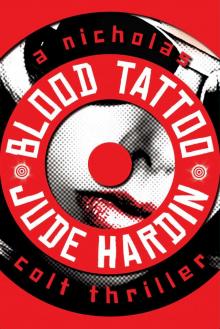 Blood Tattoo (A Nicholas Colt Thriller Book 5)
Blood Tattoo (A Nicholas Colt Thriller Book 5) Racked (A Lt. Jack Daniels / Nicholas Colt mystery)
Racked (A Lt. Jack Daniels / Nicholas Colt mystery)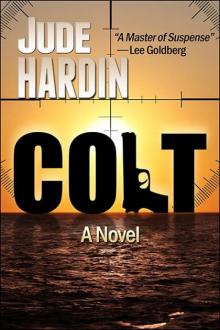 COLT (A Nicholas Colt Thriller)
COLT (A Nicholas Colt Thriller)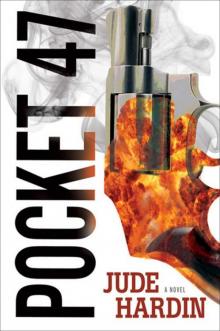 Pocket-47 (A Nicholas Colt Thriller)
Pocket-47 (A Nicholas Colt Thriller)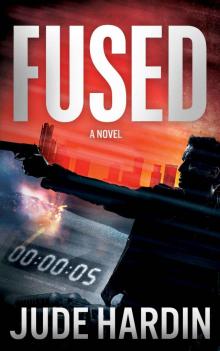 FUSED: iSEAL OMNIBUS EDITION (A Military Technothriller)
FUSED: iSEAL OMNIBUS EDITION (A Military Technothriller) THE JACK REACHER FILES: CHOKE 2 (Episode 2 in the CHOKE Series)
THE JACK REACHER FILES: CHOKE 2 (Episode 2 in the CHOKE Series) Snuff Tag 9 (A Nicholas Colt Thriller Book 3)
Snuff Tag 9 (A Nicholas Colt Thriller Book 3) THE JACK REACHER FILES: HOSTAGE
THE JACK REACHER FILES: HOSTAGE THE JACK REACHER FILES: THE GIRL FROM THE WRONG SIDE OF CORDIAL (with Bonus Thriller THE BLOOD NOTEBOOKS)
THE JACK REACHER FILES: THE GIRL FROM THE WRONG SIDE OF CORDIAL (with Bonus Thriller THE BLOOD NOTEBOOKS) 3 TERRIFYING THRILLERS
3 TERRIFYING THRILLERS The Jack Reacher Files: Fugitive
The Jack Reacher Files: Fugitive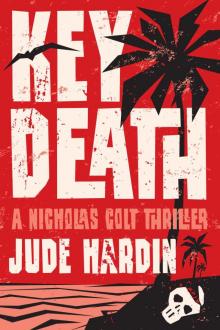 Key Death (A Nicholas Colt Thriller Book 4)
Key Death (A Nicholas Colt Thriller Book 4) SYCAMORE BLUFF (Prequel to THE JACK REACHER FILES: ANNEX 1) (A Nicholas Colt Thriller Book 8)
SYCAMORE BLUFF (Prequel to THE JACK REACHER FILES: ANNEX 1) (A Nicholas Colt Thriller Book 8)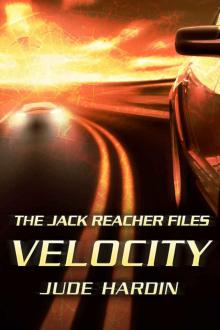 VELOCITY
VELOCITY Fire and Ice
Fire and Ice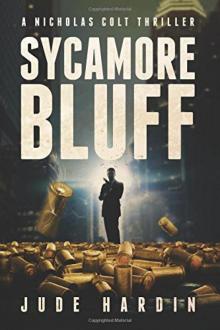 Sycamore Bluff
Sycamore Bluff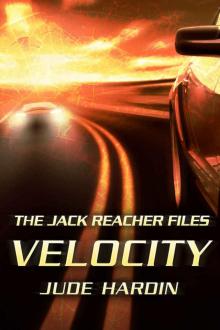 Jack Reacher Files_Velocity
Jack Reacher Files_Velocity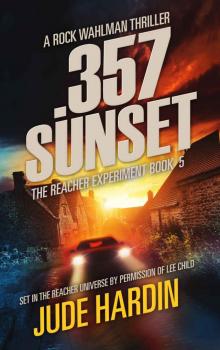 357 Sunset
357 Sunset THE JACK REACHER FILES: CHOKE (Episode 1 in the CHOKE Series)
THE JACK REACHER FILES: CHOKE (Episode 1 in the CHOKE Series)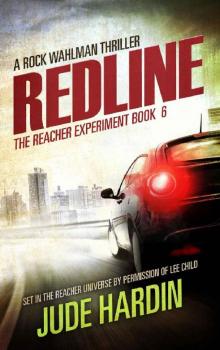 Redline: The Reacher Experiment Book 6 (The Jack Reacher Experiment)
Redline: The Reacher Experiment Book 6 (The Jack Reacher Experiment) Fugitive
Fugitive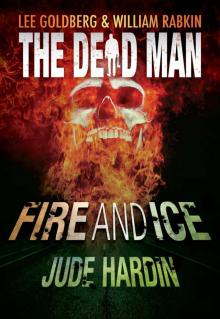 Fire and ice dm-8
Fire and ice dm-8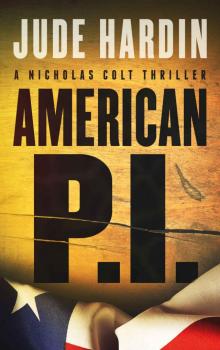 American PI
American PI THE JACK REACHER FILES: ANNEX 1 (A Novel of Suspense)
THE JACK REACHER FILES: ANNEX 1 (A Novel of Suspense)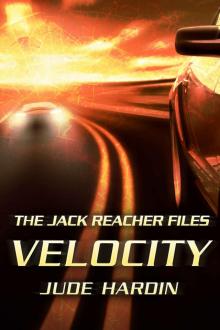 THE JACK REACHER FILES: VELOCITY (with bonus thriller CROSSCUT)
THE JACK REACHER FILES: VELOCITY (with bonus thriller CROSSCUT) The Reacher Experiment
The Reacher Experiment Hostage
Hostage Crosscut (A Nicholas Colt Thriller Book 2)
Crosscut (A Nicholas Colt Thriller Book 2) Lady 52: A Jack Daniels/Nicholas Colt Novel
Lady 52: A Jack Daniels/Nicholas Colt Novel